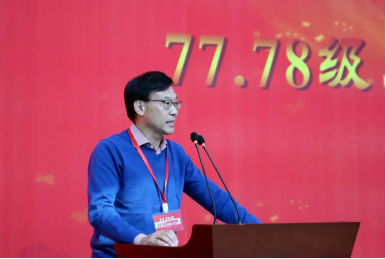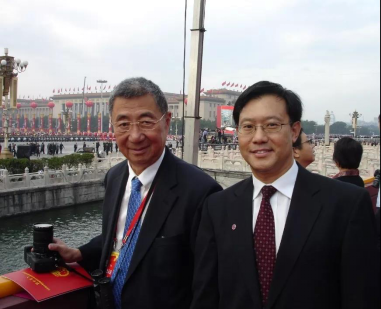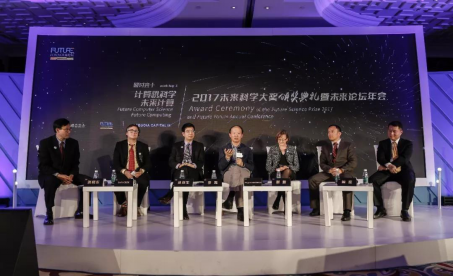By Alumni Association of Beijing University of Technology ,conducted on November 19, 2018
To be a realistic and practical scholar: an interview with Zhang Xiaodong, the alumnus ofClassNo.7723

Zhang Xiaodong is the Robert M. Critchfield Professor at the Ohio State University. His research focuses on data management in computer and distributed systems. He is also world-famous computer storage and data management expert. His multiple core algorithms and system design have a great impact on the academic and industrial circles. He has effectively optimized or updated some key technologies in the computer system, which has been now widely used in commercial processors, major operating systems, database systems and large-scale distributed systems.
Zhang Xiaodong is the first group of students enrolled in the Beijing University of Technology in1977 after the resumption of the College Entrance Examination. After graduation, he stayed at the university to teach . Later he chose to go abroad to study for a higher degree. He received his Ph.D. in Computer Science from the University of Colorado, where he was a recipient of the Distinguished Engineering Alumni Award in 2001. He also won the 2010 CCF Award for Overseas Outstanding Contributions. In recognition of his long-term contribution as head of the Department of Computer Science and Engineering at Ohio State University, hewas awarded the Joel and Ruth Spira Award for Excellence in Education Leadership by the Lutron Foundation in 2018. He is a Fellow of the ACM and a Fellow of the IEEE.
On the occasion of the 40th Anniversary of Enrollment in Beijing University of Technology in 1977 and 1978 when Zhang Xiaodong visited his alma mater from the United States and made a speech as one of the representatives for alumni of 1978, for which we took this opportunity to appoint this interview. Any academic achievements and accomplishments in scientific research and education will bring in Zhang Xiaodong many eye-catching business cards. But since he has experienced China’s great era and made great efforts in the exploration and achievements of western scientific research, he prefers to name the title of this interview as “being a realistic and practical scholar”, which has been, according to him, his attitude along the road toward science. After hustling and bustling life, the overwhelmed simplicity presented by the humble professor made us feel so close and generous.
Q: Could you please tell us what had you done after graduation from BJUT?
A: I'm from Class No.7723 (with major in Automation of 1977). During the year of graduation, our class was transferred to the newly established Department of Computer. At the beginning of 1982, I stayed at BJUT and became a junior teacher. I still keep the red school badge and work permit now. I am very grateful to my teachers who have taught and helped me, my colleagues who have worked together and my close classmates who have been encouraging me to make progress all the time. They have cheered me up during nearly six years of golden time at BJUT, which is also the proudest beginning for me as a computer scholar.
At the end of 1983, I left BJUT to study in the United States. In 1989, I received my Ph.D. from the University of Colorado when I began my journey as faulty in three American universities. Since 2006, I have been a Chair Professor at Ohio State University and Dean of the Department of Computer Science and Engineering for 12 years. Zhang Xiaodong believes that a scholar should have an independent and critical mind, and habitually make objective analysis, evaluation, opposition and interpretation on matters and public opinion.
Q: Can you talk about your experience of leadership in American universities?
A: After my arrival in the United States, I first served as the chairman of the Chinese Students and Scholars Association at the University of Colorado, and then as the departmental head of the three universities where I taught. I also served as the Discipline Director of the National Science Foundation of the United States for two years. Years of experience has reflected me the following characteristics for a good leader. First, he must be fair at work, act pursuant to the established rules and put aside emotions. Second, he needs to have a forward-looking vision and clear objectives, as well as becoming man of action. Third, he should be highly capable of organizing and coordinating the team, plus a high awareness of service. Fourth, he should have excellent speech and communication skills. The leadership is mainly evaluated by bottom-up supervision and of course, by superior leaders.
Q: News said that you often come back to China for communication. Could you tell us something about this?
A: I am one of the initiators and organizers of the “Dragon Star Lecture” program and have been the chairman of the Organizing Committee for a long time. Since 2002, the Lecture would invite a group of Chinese professors with academic achievements in overseas academic circles every year to systematically offer multiple postgraduate courses on computer, electronics and bioinformatics across universities in China. I am a lecturer too. I give lectures at a university every year. We offer about 8 open courses every year to universities all over the country free of charge. This program has become an integral part of information education for postgraduates in China. In the past two decades, tens of thousands of students and young teachers from the Chinese Mainland, Hong Kong, Macao and Taiwan have taken our courses. Many of them have become the backbone among academic and industrial circles.
On October 1, 2009, at the invitation of the State Council, Zhang Xiaodong returned to participate in the grand celebration of the 60th anniversary of the founding of People’s Republic of China. This is a picture taken by a reporter from Xinhua News Agency for him and Professor Ding Zhaozhong on the Tian’anmen viewing stand.

In October 2017, at the ceremony of Future Science Prize and the Future Forum in Beijing, Zhang Xiaodong chaired the Future Computer Science Forum, talking and communicating with tens of thousands of audiences, including many teenagers, in a both on-line and on-site manner.

From left: Zhang Xiaodong
Luis Ceze (University of Washington)
Cong Jingsheng (UCLA)
Li Kai (Princeton University)
Margaret Martonosi (Princeton University)
Xie Yuan (UC Santa Barbara)
Zhou Kui (Sequoia Capital).
Q: What’s your expectations for BJUT, your alma mater?
A: It delighted me that since last year, the university has been listed as world-class universities and first-class disciplines, which presents a new starting point. Since its establishment 58 years ago, it has been our focus to serve the capital by feeding Beijing with a large number of talents and making many contributions to science, technology and culture over the years. After joining the “Double-First Class” initiative, our goal and vision should be wider because of consensus on world-class standards, regardless of region or country. A world-class university harbors two definite missions: inheriting human knowledge and cultural heritage, and developing new knowledge to improve productivity, mankind’s environment and health. Led by this higher goal, we will do better for Beijing’s development.
Q: What would you like share to students at BJUT?
A: BJUT has been employing fairly high entry score, that is to say, students enrolled in the university has good intelligence. Since life is a long-distance run, intelligence is definitely crucial, but it is the habit and character that play a decisive role. High intelligence cannot promise you ambition and resilience. What I want to emphasize for BJUTers is three academic characters:
(1)We should be grateful and keep awed; we should cherish things.
(2) We need to explore the facts, think independently and seek the truth.
(3) We should work hard; we should have stamina and patience.







